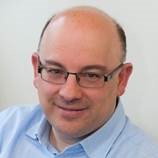Interview with Professor Johann de Bono
31 Oct 2023
 A study that has found a new treatment that may be able to reverse drug resistance in prostate cancer patients by targeting myeloid cells was recently published in the journal Nature. We spoke to Professor Johann de Bono, Lead at The Institute of Cancer and Royal Marsden Hospital ECMC to find out more.
A study that has found a new treatment that may be able to reverse drug resistance in prostate cancer patients by targeting myeloid cells was recently published in the journal Nature. We spoke to Professor Johann de Bono, Lead at The Institute of Cancer and Royal Marsden Hospital ECMC to find out more.
Could you tell us a little about the trial and what it showed?
This trial was an investigator-initiated trial developed at the ESMO/AACR/EORTC workshop on Methods in Clinical Cancer Research at Flims, and was based on our work showing that myeloid cell transcripts in whole blood transcriptome analyses associated with aggressive cancers and worse survival, as well as work demonstrating that a high neutrophil-lymphocyte ratio (NLR) predicted worse response rates to most treatments. This in conjunction with preclinical work from the laboratories of Jesus Gil and Andrea Alimonti led us to believe that targeting CXCR2 would block myeloid cells being ‘sucked into’ tumours, and reverse treatment resistance by limiting a process known as the SASP or senescence-associated secretory phenotype.
What have you found most exciting about the findings from this trial and what impact will they have on cancer patients?
We have shown that a high blood NLR associates with high intratumour myeloid derived suppressor cells (MDSCs), as well as transcripts associated with fresh tumour biopsy senescence and SASP transcripts in RNAseq studies including the expression of CXCR2 ligands. We have shown these CXCR2 ligands’ expression associate with poor prognosis from prostate cancer. We then went on to show that by targeting CXCR2 we blocked myeloid cells being sucked into tumours, and in several patients whose tumours had TP53 wildtype disease this reversed treatment resistance. We believe these data may have broad applicability.
Was there anything particularly challenging along the way?
Raising sufficient funding to run this complex trial was very challenging.
What role did your ECMC support and being part of the ECMC network play in this trial?
Staff funded by the ECMC were involved in conducting this trial which was run at ECMCs in the UK as well as in Bellinzona, Switzerland.
It’s great to see such promising results from the trial, what do you and the team plan to do next?
We are planning further studies to elucidate how to best impact this biology and reverse treatment resistance.
